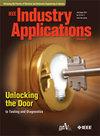Interval Multi-Objective Optimization for Low-Carbon Building Energy Management System Upon Deep Reinforcement Learning
IF 4.2
2区 工程技术
Q2 ENGINEERING, ELECTRICAL & ELECTRONIC
引用次数: 0
Abstract
To improve building energy efficiency and reduce the impact of scheduling uncertainty, a low-carbon optimization method for intelligent buildings based on deep reinforcement learning interval multi-objective optimization is proposed. Firstly, interval mathematics is used to model the multiple uncertainties in the system. Secondly, considering the system's carbon emissions and carbon transaction costs, optimize the system operation with the goal of the lowest comprehensive operating cost and the best user comfort. Thirdly, to solve the problem of interval multi-objective optimization, deep Q-network (DQN) and interval multi-objective particle swarm optimization (IMOPSO) are proposed for “offline training” and “online guidance”. The low-carbon optimization scheduling problem of intelligent buildings under multiple uncertain factors is efficiently solved. Case studies show that the proposed IMOPSO based on DQN can consider the system's low carbon, economical and user comfort, which effectively improves the system's ability to deal with uncertain factors.利用深度强化学习实现低碳建筑能源管理系统的区间多目标优化
本文章由计算机程序翻译,如有差异,请以英文原文为准。
求助全文
约1分钟内获得全文
求助全文
来源期刊

IEEE Transactions on Industry Applications
工程技术-工程:电子与电气
CiteScore
9.90
自引率
9.10%
发文量
747
审稿时长
3.3 months
期刊介绍:
The scope of the IEEE Transactions on Industry Applications includes all scope items of the IEEE Industry Applications Society, that is, the advancement of the theory and practice of electrical and electronic engineering in the development, design, manufacture, and application of electrical systems, apparatus, devices, and controls to the processes and equipment of industry and commerce; the promotion of safe, reliable, and economic installations; industry leadership in energy conservation and environmental, health, and safety issues; the creation of voluntary engineering standards and recommended practices; and the professional development of its membership.
 求助内容:
求助内容: 应助结果提醒方式:
应助结果提醒方式:


